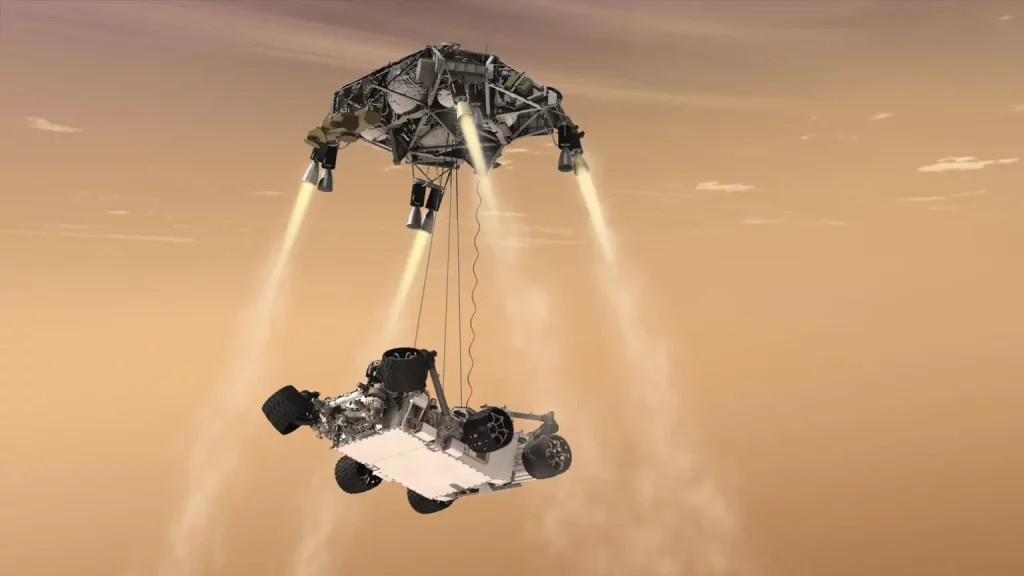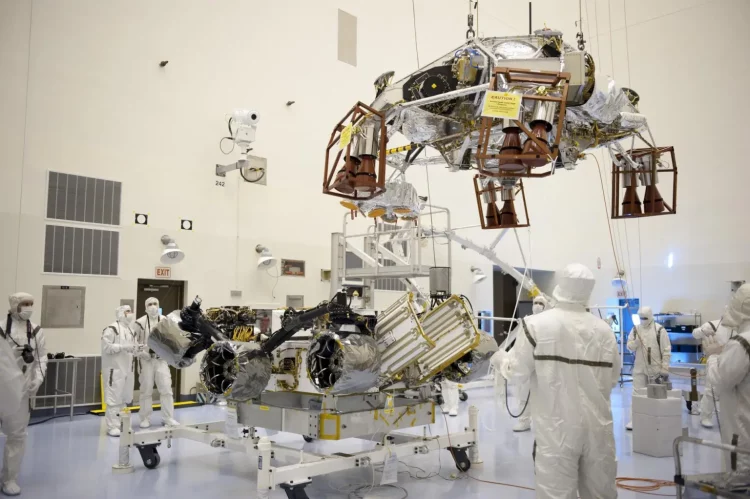NASA’s Curiosity rover, part of the Mars Science Laboratory mission, has profoundly impacted how we explore the Red Planet. One of the most innovative aspects of Curiosity’s landing was the use of the Sky Crane, a novel landing system that has redefined planetary exploration techniques. This article delves into the intricate details of the Sky Crane, its development, its implementation in Curiosity’s mission, and its broader implications for future Mars exploration.
1. Introduction to the Mars Science Laboratory Mission
The Mars Science Laboratory (MSL) mission, which deployed the Curiosity rover, represents a significant milestone in NASA’s exploration of Mars. Launched on November 26, 2011, and landing on Mars on August 6, 2012, Curiosity was designed to explore the Martian surface, search for signs of past habitability, and analyze the planet’s geology and atmosphere.
1.1 Mission Objectives
Curiosity’s mission had several key objectives:
- Assessing Habitability: To determine if Mars had ever been capable of supporting microbial life.
- Analyzing Geology: To study Martian rocks and soil to understand the planet’s geological history.
- Climate Study: To investigate the current Martian climate and its variations over time.
- Preparing for Future Missions: To test new technologies and methods that will aid future exploration, including human missions to Mars.
1.2 Significance of the Mission
The MSL mission has provided invaluable data about Mars, advancing our knowledge of the planet’s history and its potential for supporting life. Curiosity’s findings have reshaped our understanding of Mars and have implications for future exploration and potential human colonization.
2. The Challenge of Landing on Mars
Landing on Mars presents unique challenges due to the planet’s thin atmosphere, which offers little friction to slow down landing vehicles. Unlike the Moon, which has no atmosphere to speak of, Mars requires a more complex landing system to ensure a safe touchdown. The Sky Crane system, developed for Curiosity, was a groundbreaking solution to this problem.
2.1 Traditional Landing Techniques
Historically, landing on Mars involved either direct impact or the use of airbags to cushion the descent. However, these methods posed limitations:
- Direct Impact: Risky due to the high velocity of the descent and the need for precise landing site targeting.
- Airbags: Effective for smaller rovers, but less suitable for larger and heavier vehicles like Curiosity, which required a more controlled landing approach.
2.2 Requirements for a New Approach
To address these challenges, NASA needed a landing system that could:
- Slow Down Effectively: Decelerate the spacecraft from high speed to a soft landing.
- Precision Landing: Ensure accurate placement of the rover on the Martian surface.
- Deploy Safely: Allow for the safe deployment of scientific instruments and avoid damage to the rover.
3. The Sky Crane: An Innovative Solution
The Sky Crane was an innovative solution developed to address the unique challenges of landing a large rover on Mars. The system represented a departure from traditional landing methods, incorporating a complex combination of technologies to achieve a controlled landing.
3.1 Design and Components
The Sky Crane system consisted of several key components:
- Entry, Descent, and Landing (EDL) System: This system included a heat shield to protect the rover during atmospheric entry and a supersonic parachute to slow its descent.
- Descent Stage: A component equipped with rocket engines to further decelerate the rover after the parachute had deployed. This stage also contained the Sky Crane mechanism.
- Sky Crane: A landing platform that used thrusters to lower the rover gently to the Martian surface. The Sky Crane was attached to the rover by cables and was designed to precisely control the descent.
3.2 How the Sky Crane Works
The landing sequence involved several stages:
- Atmospheric Entry: The spacecraft entered Mars’ atmosphere at high speeds, protected by the heat shield.
- Parachute Deployment: At a lower altitude, the supersonic parachute deployed to slow the descent further.
- Descent Stage Activation: After the parachute phase, the descent stage ignited its rocket engines to continue decelerating.
- Sky Crane Deployment: The Sky Crane, with its thrusters, lowered the rover to the surface. Once the rover touched down, the Sky Crane cut the cables and flew away to crash-land safely at a distance.
3.3 Innovations and Benefits
The Sky Crane offered several advantages over traditional methods:
- Precision Landing: Enabled accurate placement of the rover, critical for scientific experiments requiring specific locations.
- Controlled Descent: Allowed for a smooth and controlled descent, minimizing the risk of damage to the rover.
- Flexibility: Accommodated larger and more complex rovers, paving the way for future missions with advanced scientific instruments.

4. Implementation and Success of Curiosity’s Landing
Curiosity’s landing on Mars marked a historic achievement for NASA and demonstrated the effectiveness of the Sky Crane system. The mission’s success provided valuable data and insights into Mars’ surface and environment.
4.1 The Landing Sequence
The landing sequence, known as the “seven minutes of terror,” was a high-stakes operation:
- Entry into the Atmosphere: The spacecraft entered the Martian atmosphere at speeds exceeding 13,000 miles per hour.
- Parachute Deployment: The parachute deployed at about 7 miles above the surface, slowing the descent to a more manageable speed.
- Descent Stage Burn: The descent stage’s rocket engines ignited to further reduce speed and guide the rover to its landing site.
- Sky Crane Operation: The Sky Crane lowered Curiosity to the surface with precision. After touchdown, the Sky Crane’s cables were severed, and the descent stage flew away to crash safely.
4.2 Results and Impact
The landing was a resounding success, with Curiosity touching down in Gale Crater as planned. The successful implementation of the Sky Crane system:
- Validated New Technology: Demonstrated the feasibility and effectiveness of the Sky Crane approach for future Mars missions.
- Provided Critical Data: Enabled Curiosity to begin its scientific operations and gather data on Martian geology, climate, and potential habitability.
- Set a Precedent: Established a new standard for landing large rovers on Mars, influencing subsequent missions and technologies.
5. Broader Implications for Mars Exploration
Curiosity’s successful landing and the use of the Sky Crane have had significant implications for Mars exploration and future space missions.
5.1 Advancements in Landing Technology
The Sky Crane technology has paved the way for:
- Future Mars Missions: Influencing the design of future rovers and landers, including those intended for sample return missions and human exploration.
- Enhanced Capabilities: Allowing for larger and more complex scientific instruments to be deployed on Mars, expanding the scope of exploration.
5.2 Influence on Other Space Agencies
The success of the Sky Crane has influenced other space agencies and organizations:
- International Collaboration: Inspiring collaborative efforts between space agencies to develop and share technologies for planetary exploration.
- Commercial Space Missions: Providing insights for private space companies developing their own exploration technologies.
5.3 Inspiring Future Exploration
Curiosity’s mission and the innovative landing approach have inspired future generations:
- Educational Impact: Serving as a case study in engineering and space exploration for students and researchers.
- Public Interest: Capturing the imagination of the public and fostering interest in space science and exploration.
6. Looking Ahead: Future Mars Missions
The success of Curiosity’s Sky Crane has set the stage for future Mars missions and exploration endeavors.
6.1 Upcoming Missions
NASA and its partners are planning several ambitious missions:
- Mars Sample Return: A mission to collect samples from the Martian surface and return them to Earth for analysis.
- Mars 2020 Rover: The Perseverance rover, which builds on Curiosity’s successes and aims to search for signs of past life and collect samples.
- Human Exploration: Long-term goals of sending humans to Mars, requiring advancements in landing technology, life support systems, and habitat construction.
6.2 Technological Innovations
Future missions will benefit from continued advancements in technology:
- Improved Landing Systems: Further refinements in landing technology to accommodate larger and more sophisticated spacecraft.
- Enhanced Scientific Instruments: Development of advanced tools and instruments for detailed analysis of Martian samples and environments.
6.3 Collaboration and Global Efforts
Continued collaboration between space agencies and international partners will be crucial:
- Global Partnerships: Expanding international cooperation to share knowledge, resources, and technology.
- Joint Missions: Collaborative missions that leverage the expertise and capabilities of multiple organizations.
7. Conclusion
Curiosity’s Sky Crane has revolutionized Mars exploration by providing a groundbreaking approach to landing large rovers on the Martian surface. The success of this technology has had far-reaching implications for planetary exploration, influencing future missions and inspiring new innovations.
As we look to the future of Mars exploration, the advancements made through the Sky Crane system will continue to drive progress and open new possibilities for scientific discovery and exploration. NASA’s commitment to pushing the boundaries of space technology and exploration ensures that we will continue to learn more about Mars and its potential for supporting life, paving the way for future missions and human exploration of the Red Planet.











































Discussion about this post